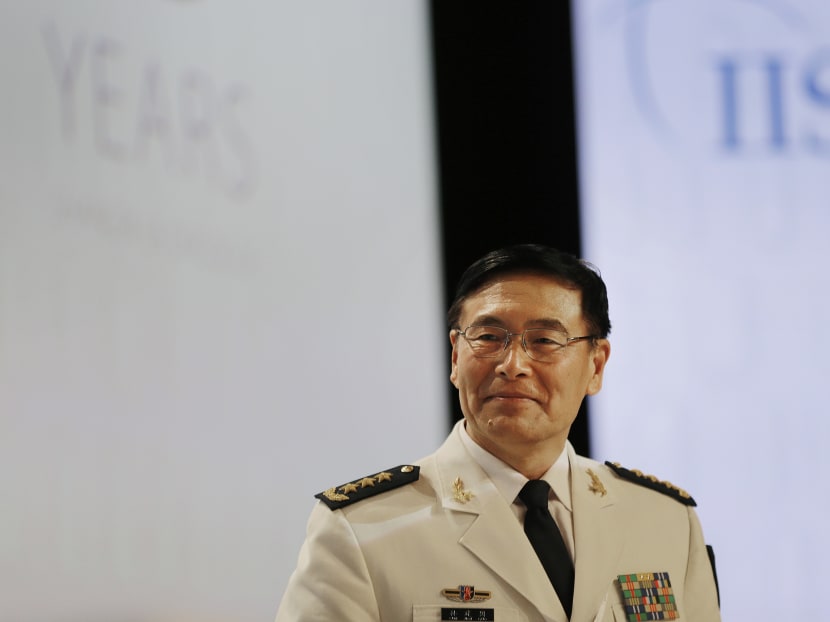China hits back at US, reasserts claims in S China Sea
SINGAPORE — China rebuffed the United States’ pressure to curb its assertive behaviour in the South China Sea on Sunday (June 5), restating its sovereignty over most of the disputed territory and saying it “has no fear of trouble”.

China's Deputy Chief, Joint Staff Department, Central Military Commission, Admiral Sun Jianguo arrives for a plenary session at the 15th International Institute for Strategic Studies Shangri-la Dialogue, or IISS, Asia Security Summit on Sunday, June 5, 2016, in Singapore. Photo: AP
SINGAPORE — China rebuffed the United States’ pressure to curb its assertive behaviour in the South China Sea on Sunday (June 5), restating its sovereignty over most of the disputed territory and saying it “has no fear of trouble”.
On the last day of Asia’s biggest security summit, Admiral Sun Jianguo, a deputy chief of the Joint Staff Department of China’s Central Military Commission, said China would not be bullied, including over a pending international court ruling over its claims in the vital trade route.
“We do not make trouble, but we have no fear of trouble,” Adm Sun told the Shangri-La Dialogue in Singapore, where more than 600 security, military and government delegates had gathered over three days.
“China will not bear the consequences, nor will it allow any infringement on its sovereignty and security interest, or stay indifferent to some countries creating chaos in the South China Sea,” he stated, while stressing Beijing’s desire for a peaceful resolution.
He also said the South China Sea issue has become “overheated because of the provocations of certain countries for their own selfish interests” — an apparent reference to the US and its treaty ally the Philippines.
China claims almost the entire South China Sea. Brunei, Malaysia, the Philippines, Taiwan and Vietnam also have claims. The waterway has become a flashpoint between the US, which increased its focus on the Asia-Pacific under President Barack Obama’s “pivot”, and China, which is projecting ever greater economic, political and military power in the region.
The two have traded accusations of militarising the waterway as Beijing undertakes large-scale land reclamation and construction on disputed features while Washington has increased its patrols and exercises ostensibly to uphold freedom of navigation.
Rhetoric has escalated ahead of a decision at the Permanent Court of Arbitration in The Hague on a case brought by Manila against China, which says it will not recognise any ruling.
On Saturday, top US officials including Defence Secretary Ashton Carter warned China of the risk of isolating itself internationally as a result of its position on South China Sea.
During a visit to Mongolia on Sunday, US Secretary of State John Kerry urged Beijing not to establish an air defence identification zone over the South China Sea as it did over the East China Sea in 2013, saying that it would be “a provocative and destabilising act”.
Adm Sun on Sunday said US naval and air patrols in the sea were a display of “military muscle” and China was being forced to “accept and honour” the Hague ruling. He also rejected the prospect of China being isolated diplomatically, saying that many of the Asian countries at the gathering were “warmer” and “friendlier” to China than they were a year ago.
“We were not isolated in the past, we are not isolated now and we will not be isolated in the future,” Adm Sun said. China had 17 bilateral meetings this year, compared with 13 in 2015.
“Actually I am worried that some people and countries are still looking at China with the Cold War mentality and prejudice. They may build a wall in their minds and end up isolating themselves,” he added.
Adm Sun said China wanted to solve the dispute with the Philippines bilaterally and said the door was open for dialogue with incoming President Rodrigo Duterte. “China has the patience and wisdom to settle any disputes through dialogue. We also believe the related countries have the wisdom and patience to make peace,” he said. “I’ve always believed that shaking hands is better than clenching fists.”
At the security summit, many speakers had stressed the importance of freedom of navigation and overflight in the waters, through which several trillion of dollars in trade is shipped every year. Adm Sun denied such concerns should be focused on China. “If there is any restriction (in trade) ... it will definitely not be China’s fault. If you don’t believe it, just wait and see.”
Referring to comments by the US and other countries against China, Foreign Ministry spokesperson Hua Chunying said on Sunday that “they were mostly repeating their old tunes, which have no fact in them and are full of groundless accusations against China’s legitimate construction activities on relevant islands and reefs.”
She said China has been blamed for regional security issues when it is actually the victim. “Non-regional countries should stick to their commitments and make no irresponsible remarks on the issue of territorial sovereignty,” she added.
Speaking at a separate plenary session at the forum on Sunday, Singapore’s Defence Minister Ng Eng Hen noted that the US-China relationship, along with terrorism, continue to take centre stage in the world today, 15 years after the late Mr Lee Kuan Yew had highlighted the two issues at the inaugural Shangri-La Dialogue in 2002.
“With US and China as the main protagonists, the South China Sea and territorial disputes therein, willy-nilly has provided the stage on which this strategic rivalry is being played out,” Dr Ng said. “I think all of us are conscious that more is at stake than disputed rocks or islands. As Mr Lee observed in his 2002 speech — ‘the competition for economic and diplomatic influence has started’. This contest will de facto set new rules and players that will govern state-to-state relations and geopolitics in Asia and beyond for the decades to come.” AGENCIES





